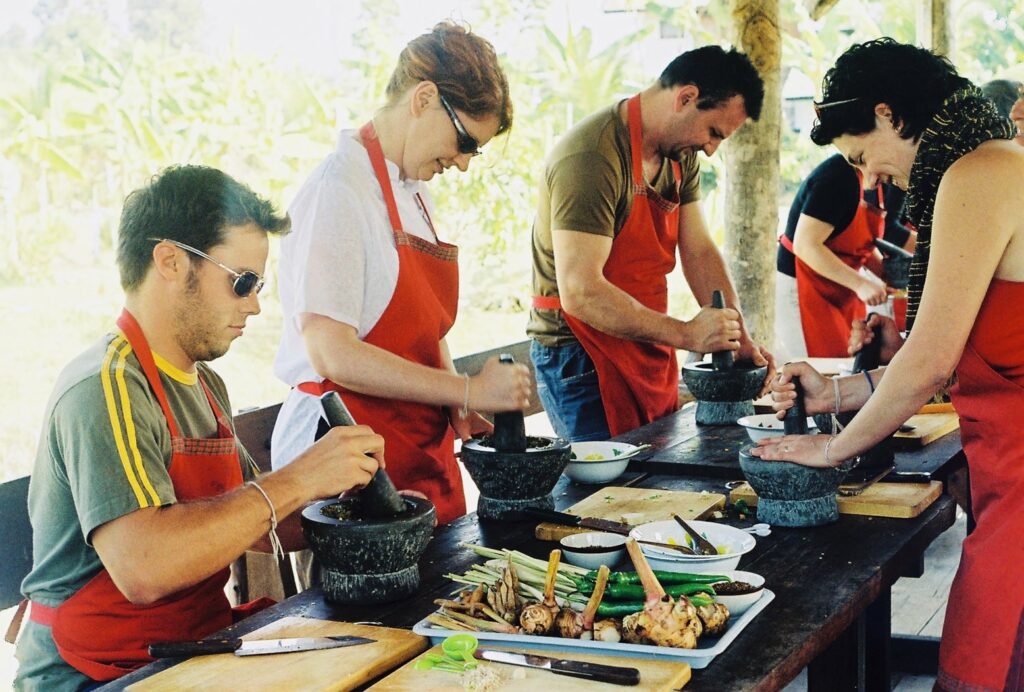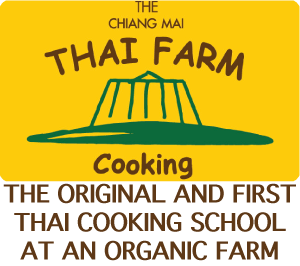
Nestled among the lush mountains of Northern Thailand, Chiang Mai is not only famed for its ancient temples and vibrant markets but also for its rich culinary traditions. Unlike the spicy and sweet flavors of southern Thai cuisine, Northern Thai food, or Lanna cuisine, is known for its milder, herbaceous, and earthy flavors. In Chiang Mai, food is more than just sustenance — it’s a way of connecting with culture, history, and family traditions.
For travelers and food enthusiasts, learning how to cook Thai dishes in Chiang Mai offers an unforgettable cultural experience. Cooking classes here are abundant and diverse, often set in serene locations surrounded by rice paddies or gardens, creating an immersive environment that highlights the freshness and authenticity of local ingredients.
Why Chiang Mai Is Perfect for Learning Thai Cooking
Chiang Mai’s relaxed atmosphere and deep-rooted culinary traditions make it an ideal place for cooking enthusiasts. Compared to the bustling streets of Bangkok, Chiang Mai offers a slower, more intimate experience. Cooking schools here often emphasize the importance of local produce, organic farming, and traditional methods.
In addition, Chiang Mai’s bustling markets — such as Warorot Market or the Saturday and Sunday Walking Streets — are treasure troves of exotic ingredients. Many cooking classes begin with a market tour, allowing students to learn how to select the best herbs, spices, and vegetables essential for authentic Thai dishes.
The city’s accessibility and the warm hospitality of its people ensure that even novice cooks feel welcomed and confident during their culinary explorations.
The Structure of a Typical Thai Cooking Class in Chiang Mai

Whether you sign up for a half-day class or a full-day workshop, most Thai cooking experiences in Chiang Mai follow a similar structure:
1. Market Tour
Many classes begin with a visit to a local market where instructors introduce students to key Thai ingredients like lemongrass, kaffir lime leaves, galangal, Thai basil, and bird’s eye chilies. Understanding these essential ingredients is crucial to mastering the balance of sweet, sour, salty, and spicy flavors that define Thai cuisine.
2. Menu Selection
Participants often choose dishes they wish to learn. Typical selections include:
- Appetizers: Fresh spring rolls, papaya salad (som tam)
- Curries: Green curry, red curry, Massaman curry
- Soups: Tom Yum Goong (spicy shrimp soup), Tom Kha Gai (chicken coconut soup)
- Main Dishes: Pad Thai, stir-fried basil chicken (pad kra pao)
- Desserts: Mango sticky rice, coconut milk desserts
3. Hands-On Cooking
Students prepare several dishes under close supervision. Each step — from pounding curry paste in a mortar and pestle to frying noodles at the right temperature — is explained carefully. The hands-on nature ensures that everyone gets a full sensory experience.
4. Feast and Feedback
After the cooking session, students enjoy a sit-down meal featuring the dishes they’ve prepared, sharing experiences and receiving feedback from instructors.
Unique Features of Chiang Mai Cooking Schools
What sets Chiang Mai’s cooking schools apart is their deep connection to the land and tradition. Here are a few distinctive features:
- Farm-to-Table Experiences: Schools like Thai Farm Cooking School take students to organic farms where they pick fresh ingredients before cooking.
- Vegetarian and Vegan Focus: Chiang Mai’s strong vegetarian community has encouraged many cooking schools to offer fully plant-based Thai cooking classes.
- Cultural Integration: Some classes incorporate cultural activities like traditional rice planting, herbal medicine making, or visits to local villages.
Popular Thai Cooking Class in Chiang Mai
If you’re planning to take a Thai cooking class in Chiang Mai, this is our recommended cooking school:
- Thai Farm Cooking School: Ideal for those seeking an organic, farm-to-table experience away from the city center www.thaifarmcooking.com
Must-Learn Dishes in Chiang Mai
A dish that is deeply tied to the Lanna heritage and are must-learns for anyone exploring Chiang Mai cooking:
- Khao Soi: A rich, creamy curry noodle soup made with coconut milk, crispy noodles, and either chicken or beef. Khao Soi is the crown jewel of Northern Thai cuisine.
This dish embodies the complex, layered flavors that make Northern Thai cuisine unique and unforgettable.
Cultural Insights Gained Through Thai Cooking
Cooking classes in Chiang Mai are not just about following recipes. They offer insights into Thai values such as:
- Community and Sharing: Meals are a communal affair, emphasizing the importance of family and community.
- Respect for Ingredients: Thai cooking highlights minimal waste and maximal flavor extraction, honoring every part of an ingredient.
- Balance and Harmony: Thai cuisine teaches the delicate balance between different taste elements, reflecting a broader cultural philosophy of harmony.
Participants often leave with not just recipes, but also a deeper appreciation for Thai culture and ways of life.
Learning Thai cooking in Chiang Mai is more than a culinary lesson — it’s a full cultural immersion. From the bustling local markets to the serene countryside farms, every moment teaches something valuable about food, community, and tradition. Whether you’re a seasoned cook or a kitchen novice, Chiang Mai offers a welcoming, enriching environment to develop your skills and create lasting memories.
If you’re visiting Chiang Mai, make sure to set aside a day for a cooking class. You’ll return home not only with delicious recipes but also with a piece of Thailand’s heart.

Pingback: pilules amaigrissantes canadiennes kamagra sans ordonnance
Pingback: cheapest buy enclomiphene generic ireland
Pingback: ordering androxal buy in the uk
Pingback: cheap dutasteride cheap wholesale
Pingback: how to order flexeril cyclobenzaprine australia suppliers
Pingback: cheap gabapentin usa online
Pingback: order fildena canadian sales
Pingback: buy cheap itraconazole cheap from usa
Pingback: purchase staxyn canada drugs
Pingback: cheap avodart france where to buy
Pingback: is there a generic xifaxan avaliable in the usa
Pingback: Buy rifaximin without a perscription to ship overnight
Pingback: kamagra online bez kanady na předpis
Your writing evokes memory and imagination simultaneously. Familiarity and discovery coexist, creating a layered, resonant reading experience.
Vấn đề bảo mật luôn được thương hiệu quan tâm và đặt lên hàng đầu. Hội viên khi tham gia sẽ không cần phải lo lắng về vấn đề thông tin cá nhân quan trọng bị rò rỉ hoặc xâm nhập trái phép từ bên ngoài. 888slot com Đăng Nhập không chỉ thiết lập một loạt chính sách quan trọng mà còn cung cấp tính năng mã hóa bảo vệ đa lớp cùng hệ thống tường lửa thép đặc biệt. TONY12-24
888slot tự hào với đội ngũ chuyên gia soi kèo giàu kinh nghiệm, cung cấp các nhận định chuyên sâu hoàn toàn miễn phí. TONY01-06S
**mitolyn**
Mitolyn is a carefully developed, plant-based formula created to help support metabolic efficiency and encourage healthy, lasting weight management.
https://t.me/s/pov_1win
**aquasculpt**
aquasculpt is a premium metabolism-support supplement thoughtfully developed to help promote efficient fat utilization and steadier daily energy.
**herpafend reviews**
Herpafend is a natural wellness formula developed for individuals experiencing symptoms related to the herpes simplex virus. It is designed to help reduce the intensity and frequency of flare-ups while supporting the bodys immune defenses.
**prodentim official website**
ProDentim is a distinctive oral-care formula that pairs targeted probiotics with plant-based ingredients to encourage strong teeth, comfortable gums, and reliably fresh breath
**men balance pro**
MEN Balance Pro is a high-quality dietary supplement developed with research-informed support to help men maintain healthy prostate function.
**prostafense reviews**
ProstAfense is a premium, doctor-crafted supplement formulated to maintain optimal prostate function, enhance urinary performance, and support overall male wellness.
**neurosharp**
Neuro Sharp is an advanced cognitive support formula designed to help you stay mentally sharp, focused, and confident throughout your day.
**back biome**
Mitolyn is a carefully developed, plant-based formula created to help support metabolic efficiency and encourage healthy, lasting weight management.
I always look forward to your posts; they’re both informative and inspiring.
This post was exactly what I needed, and I’m so grateful you took the time to write it.
I always look forward to your posts—they’re both inspiring and informative.